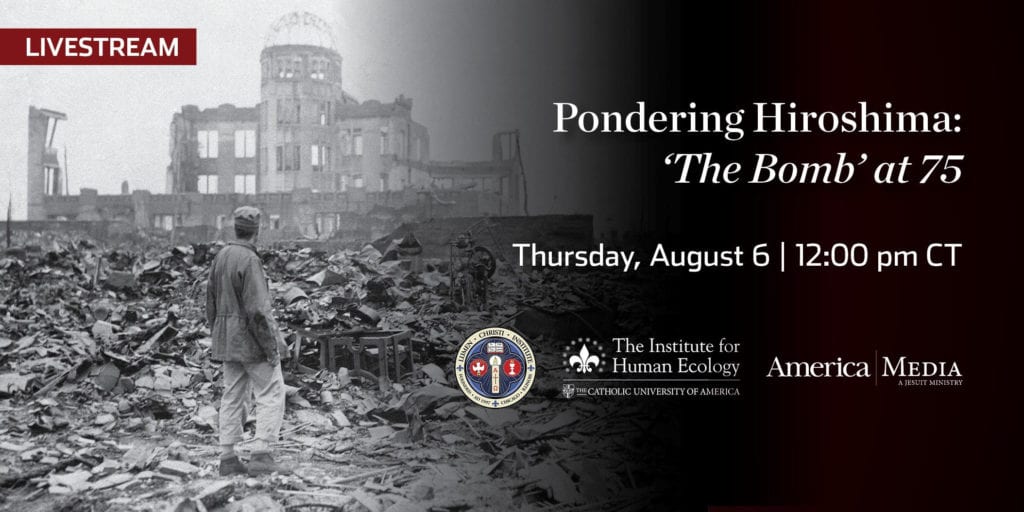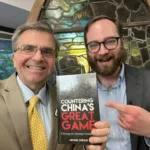This past Thursday, August 6th, marked the 75th anniversary of the dropping of an atomic bomb by the United States on Hiroshima, Japan. The attacks by the U.S., virtually marking the end of the war in the Pacific, have gone down in history as actions that have been left by many as questionable. The morality of using atomic weapons on a civilian population has sparked debate among believers and non-believers alike.
In a webinar event hosted by the Institute for Human Ecology and the Catholic University of America, experts in military affairs and prominent leaders in the Christian community joined forces to debate and reflect upon the legacy and tension that was created by the dropping of the atomic bomb.
The panel consisted of four individuals, Andrew J. Bacevich, Archbishop Timothy P. Broglio, Fr. Drew Christiansen, S.J., and Joseph E. Capizzi. Bacevich is Professor Emeritus of International Relations and History at Boston University. He graduated from the U.S. Military Academy, and received his PhD in American Diplomatic History from Princeton University. Archbishop Timothy P. Broglio is the fourth Archbishop of the Military Services USA, and is an observer to the Committee for International Justice and Peace. Fr. Drew Christiansen, S.J., is Distinguished Professor of Ethics and Human Development in Georgetown’s School of Foreign Service and a senior fellow at the Berkley Center for Religion, Peace, and World Affairs. Finally, Joseph E. Capizzi is Ordinary Professor of Moral Theology at The Catholic University of America and is the Executive Director of the Institute for Human Ecology at The Catholic University of America.
Throughout the approximately hour and a half long discussion, the four experts debated various questions about the use of the atomic bomb. The morality behind the atomic bomb, the debate on the use of bombs on civilians, and the justification for having a war in the Pacific after a war in Europe were discussed. The four were in a general agreement that the use of an atomic weapon with the potential to damage a civilian population is not moral or Christian.
The first debate point that was brought up was in regards to the use of mass bombing in any conflict. According to Bacevich, bombs were a danger to begin with because they had the potential to harm both civilians and military personnel. The use of nuclear weapons only made the danger of harm occurring towards civilians and non-combatants more present. This point was generally agreed upon by the panelists. They decided that when a military superpower implements bombs in an armed conflict, risks are being taken. Civilians can potentially be caught in the crossfire, with the danger of homes and public land being destroyed.
Also, according to Christiansen, the use of mass bombing was sometimes viewed as being not worth the cost according to various generals. Many generals were against the use of mass bombing for fear of the lack of discrimination that came with it. The bombings and fire bombings that had occurred in Dresden and London spoke to this idea. These bombings were responsible for mass casualties on both military and civilian sides. Comparable to the scorched earth policy promoted by the Soviets, there was mass chaos and destruction of property, with public land and country sides reduced to ash and rubble.
In conjunction to the idea that mass bombings resulted in a wide amount of destruction, the idea that nuclear weapons could be potentially used would only result in more destruction. Nuclear weapons only made the danger to civilians more present according to Bacevich. More so than a conventional weapon, nuclear weapons can have long lasting effect. Generations can be affected by radiation exposure, land rendered inhospitable, and nature affected for centuries to come.
According to Christiansen, the use of weapons such as nuclear bombs goes against the orders of the Church. Christiansen claims that “The Vatican has told us that it is a crime against humanity to destroy large amounts of land, civilians, and civilization. There were other options and attacks that could have been taken instead of using nuclear weapons.”
This idea that the use of nuclear weapons was not the only option was agreed upon by all four panelists. As stated previously, nuclear weapons lack discrimination when it comes to their attack. Land invasion, continued overpowering of Japanese forces in the air by planes, and other methods of attack should have been pursued before nuclear warfare according to the panel.
Finally, the justification for a war in the Pacific was also brought into question. It was agreed upon that World War II in Europe was a just war. According to Bacevich, the Nazi regime was a force of pure evil that needed to cease to exist. The Nazis were committing documented atrocities to mass people groups and carrying out countless crimes against humanity. However, the war in the Pacific was another matter. Although the Japanese were not committing acts to the extent of the Nazis, the panelists hinted at the idea that the contention and anger that was held towards the Axis powers could have potentially been transferred over to the Japanese and the War on the Pacific.
According to Bacevich, World War II was not a war of good versus evil. He explained this belief by saying “As a boy, I viewed World War II as a war of good versus evil. I now realize that this was an oversimplification. There is now a moral complexity that exists in World War II that I now realize exists in my older and wiser age.”
The moral complexities that exist in World War II are some that are still very applicable to situations that exist today, and we as a society should take note of them. It can be rather simple to make a decision to launch a missile or bomb at a target country, but the cost in both a physical sense and a moral sense can be extreme. According to this group of scholars, the cost of using nuclear weapons is something of which we Christians should be mindful. It is their belief that nuclear weapons cause more harm than good, and that other routes to ending the War in the Pacific should have been pursued instead if possible.





Comment by David on August 11, 2020 at 3:03 pm
Both Germany and Japan were working on developing atomic weapons in WWII. We might ponder the consequences if they had succeeded. The papers of a Japanese scientist who immigrated to the US, show the Japanese effort was well underway. This was the subject of a documentary on the PBS Nova series. There are reports of a massive explosion on a Korean island that seemingly suggests an atomic device. The end of the war precluded any further work.
If you lived in Korea, China, the Philippines, or southeast Asia, your memories of what the Japanese did in WWII would not be so easily forgotten. I would question whether the Nazis were evil while the Japanese were not.
To this day, Japan minimizes WWII. Every year names of “victims of the atomic bomb” are added to a memorial book at Hiroshima, some being well over age 100. As a regular viewer of NHL World in English, the Japanese BBC, I can state that virtually the only mentions of the war are in regard to the atomic bomb and US internment of Japanese.-Americans The actions of Japan are carefully glossed over.
People forget that after WWI, the “war to end all wars,” the US largely disbanded its military. Meanwhile, Japan made the first purpose-built aircraft carrier in the world. Some military historians feel that had Japan attacked the US West Coast, effective resistance could not have been mounted until they reached the MIssissippi. There was great panic after Pearl Harbor as the US was completely unprepared.
Is there any moral difference in killing say 100k people with an atomic bomb or by dropping Sears catalogs on them.
Comment by Timothy on August 11, 2020 at 5:00 pm
Can we add ammonium nitrate packed in port side cargo containers to the list? How about bio-weapons, (think virus) experiments funded by mad scientists who take payoffs from big pharma, China, Fauci, etc. added to the list.
Comment by Dan W on August 11, 2020 at 7:01 pm
I would have been more impressed if this webinar had included a few surviving WWII combat veterans (Pacific Theater) or civilians from Korea, China or the Philippines. Having known many WWII combat veterans including my dad and my uncle, I have never met one veteran who questioned the use of those bombs. Is war ever the duty of a Christian? I don’t know, but liberating concentration camps in Europe or civilians under Japanese occupation does seem like a moral, Christian duty.
BTW, great comment David.
I can recommend a great book on the Hiroshima bombing, with eye witness testimony from Japanese and American survivors – Stephen Walker’s 2006 book Shockwave: Countdown to Hiroshima. (Read the Amazon reviews.)
Comment by Rev. Dr. Lee D Cary (ret. UM clergy) on August 12, 2020 at 7:54 am
“The four were in a general agreement that the use of an atomic weapon with the potential to damage a civilian population is not moral or Christian.” Isn’t that special?
Of course, it would have been more moral and Christian to have not used the A-Bomb on Japan. But there’s nothing moral or Christian about war. These big brains think it would have been more moral so to have executed Operation Olympic with a land invasion of Japan where many more military and civilian lives would have died?
This is just another faux academic version of virtue signaling from learned scholars.
I’ve seen war, on the ground. Not in a movie or a book. It’s the definition of horror. The quicker it can be ended, the better, for all.
Comment by L. Cary on August 12, 2020 at 8:06 am
P.S. I find little as self-servingly arrogant as a group of academics with names prefaced by “Professor” and “Archbishop” rendering a critical judgment on the morality of how war is ended. Particularly 75 years later. With lunch to follow.
L Cary
Comment by Ted on August 14, 2020 at 5:17 pm
“This is just another faux academic version of virtue signaling from learned scholars.”
Dr. Cary, I would argue that these are not “learned scholars”, but instead brain-washed indoctrinated fools with no commonsense ….. aka bleeding heart liberals.
Comment by William Gormley on August 15, 2020 at 3:56 am
Any other option to end the War in the Pacific would have lengthened the war by years and cost countless thousands more allied lives and millions more Japanese lives, mostly civilians. Any discussion of this issue which does not take into account the alternative courses of action for the allies and the attitudes, actions, and plans on the Japanese side are of little value. The Japanese were preparing for an invasion of the home islands by instructing civilians to attack American or other ground forces with sharpened sticks and farm implements. According to the words of a Japanese survivor of the war, the people were prepared to do so. At that time the Japanese people did not question their leaders, their culture was to obey. It is entirely possible there would be no nation of Japan today had the atomic bombs not been used. Employing the atomic bombs as they were might not have been a good choice, but it was the lesser of two evils.
Comment by Search4Truth on August 19, 2020 at 3:15 pm
As stated above, I ask what description you could use but evil of the Japanese war machine if you look at the way the people of China, Korea and the Philippines were treated, not to mention the Japanese prisoners of war. Then the panelists talked about alternative approaches that would have been more acceptable. Did they happen to notice that the primary alternative was estimated to cost over a million allied lives and a possible five million Japanese lives? In war, one which the U.S. did not start, there are seldom good or choices; but this was the best choice available to the war weary world in the summer of 1945.